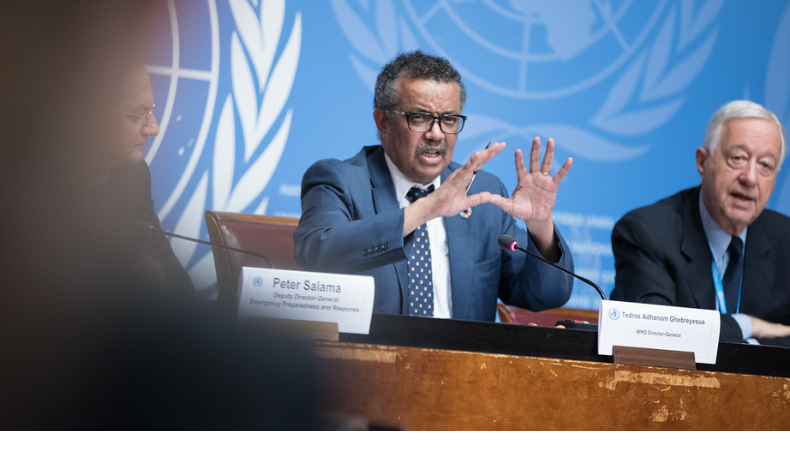WHO Declares Mpox Outbreak a Global Public Health Emergency Again

Following an amazing increase in Democratic Republic of Congo (DRC) cases, the World Health Organisation (WHO) announced on Wednesday the worldwide public health emergency second time in two years. With this statement, the degree of urgency of the outbreak becomes Public Health Emergency of International Concern (PHEIC), the highest degree of alert WHO offers. The action is meant to inspire worldwide reaction, speed research, raise money, and strengthen international cooperation to stop the virus from spreading. This categorization emphasizes the immediate need of a robust and well-coordinated worldwide reaction to control the growing problem.
Basic Need for Global Response
Earlier on Wednesday, the WHO emergency committee judged the extent of the epidemic and recommended to WHO Director-General Tedros Adhanom Ghebreyesus the suitable course of action. Tedros underlined in his speech the urgent need of a quick and coordinated global reaction to stop the epidemic and save life. “It is obvious that stopping these epidemics and saving life depend on a coordinated worldwide response,” he said. Usually benign but in rare cases can be fatal; pus-filled lesions with flu-like symptoms describe mpox. The development of a new variety has made the issue more urgently relevant.
Identification of a New Variant
A local strain called clade I started the latest epidemic in the Congo. But the situation has gotten worse since a new variety, clade Ib, seems to spread more easily through regular physical contact—including sexual activity. Thanks to this new version, the virus has quickly spread outside the boundaries of the Congo into Burundi, Kenya, Rwanda, and Uganda among other nations. Tedros remarked, “The detection and rapid spread of a new clade of MPox in eastern DRC, its detection in neighboring countries that had not previously reported mpox, and the potential for further spread inside Africa and beyond is very worrying.”
Logical and financial backing
Reacting to the growing epidemic, WHO has set aside $1.5 million in contingency money to assist quick projects aiming at viral containment. Apart from that, the company intends to spend more money during the next days; a first reaction approach calculated to demand $15 million. WHO will search outside donors for more financial help if it is to maintain and increase its response actions. Declaring an MPox emergency for Africa earlier this week, the top public health agency stressed the concerning rise in cases and deaths. Mostly affecting children in Congo, the problem has become severe with around 17,000 suspected cases and more than 500 confirmed deaths this year.
Approaches for Control of the Transmission
Professor Dimie Ogoina, chair of WHO’smpox emergency committee, said that given Congo’s record number of cases, the recent rise in cases is “extraordinary event”. Vaccines and behavioral changes helped the world to respond globally to a past MPX epidemic. While development is under progress to offer efficient immunizations, as yet there are no vaccines for the new strain. WHO is pressing nations with vaccinated populations to give doses to assist in control initiatives. Furthermore, studies on the channels of transmission inside Congo help to clarify and stop the virus from proliferating.
More general consequences and guiding actions
The global public health emergency classification of thempox epidemic as such emphasizes the increasing relevance of the issue and the requirement of a thorough and coordinated reaction among the whole society. The growth of the new, more transmissible form and the great impact on surrounding nations underlines the need of additional world collaboration, financing, and research programs. The proactive responses of WHO, which include calls for further help and the availability of contingency funds, clearly illustrate the great necessity of a coordinated effort to control the crisis and avert more escalation. Maintaining vigilance, improving public health campaigns, and guaranteeing efficient use of resources to control and limit the epidemic is especially important as the world rallies to assist these efforts.
Keep On Reading
Eventually
The second proclamation of a worldwide public health emergency for mpox by the World Health Organization emphasizes the seriousness of the matter and the immediate requirement of world cooperation. The development of a new variation and the overall influence of the epidemic throughout many nations call for a strong and coordinated reaction to properly control the situation. While WHO keeps organizing resources and looking for fresh money, the whole community has to unite to support public health protection, research development, and containment initiatives. Stopping the epidemic and protecting populations all around primarily depend on the continuous efforts to create immunizations, look at transmission channels, and boost global collaboration.







